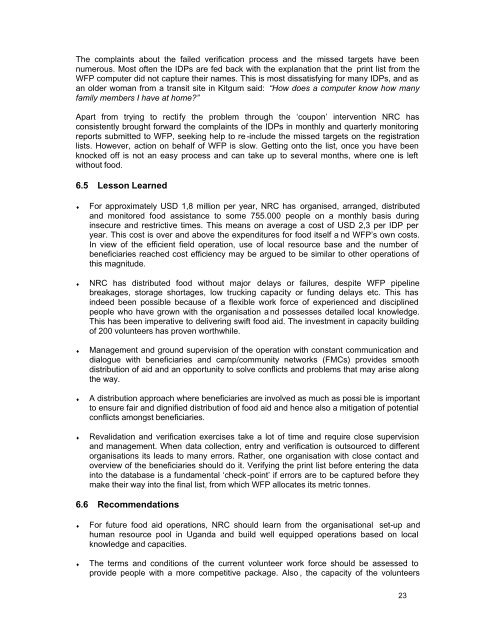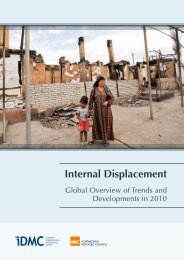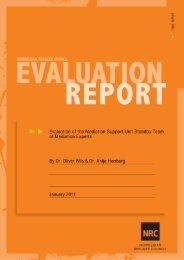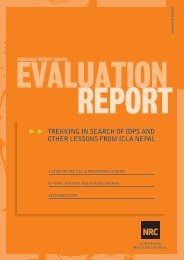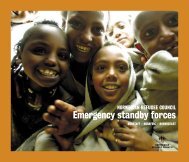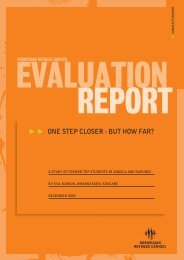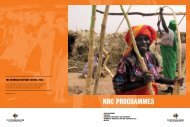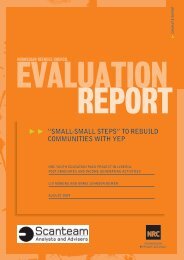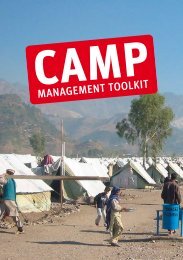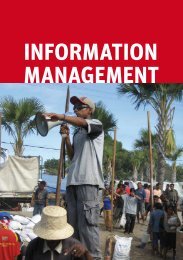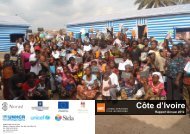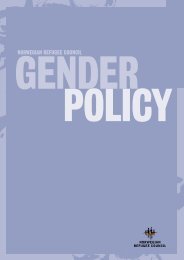evaluation of general food distribution in northern uganda: gulu ...
evaluation of general food distribution in northern uganda: gulu ...
evaluation of general food distribution in northern uganda: gulu ...
You also want an ePaper? Increase the reach of your titles
YUMPU automatically turns print PDFs into web optimized ePapers that Google loves.
The compla<strong>in</strong>ts about the failed verification process and the missed targets have beennumerous. Most <strong>of</strong>ten the IDPs are fed back with the explanation that the pr<strong>in</strong>t list from theWFP computer did not capture their names. This is most dissatisfy<strong>in</strong>g for many IDPs, and asan older woman from a transit site <strong>in</strong> Kitgum said: “How does a computer know how manyfamily members I have at home?”Apart from try<strong>in</strong>g to rectify the problem through the ‘coupon’ <strong>in</strong>tervention NRC hasconsistently brought forward the compla<strong>in</strong>ts <strong>of</strong> the IDPs <strong>in</strong> monthly and quarterly monitor<strong>in</strong>greports submitted to WFP, seek<strong>in</strong>g help to re -<strong>in</strong>clude the missed targets on the registrationlists. However, action on behalf <strong>of</strong> WFP is slow. Gett<strong>in</strong>g onto the list, once you have beenknocked <strong>of</strong>f is not an easy process and can take up to several months, where one is leftwithout <strong>food</strong>.6.5 Lesson Learned♦♦♦♦♦For approximately USD 1,8 million per year, NRC has organised, arranged, distributedand monitored <strong>food</strong> assistance to some 755.000 people on a monthly basis dur<strong>in</strong>g<strong>in</strong>secure and restrictive times. This means on average a cost <strong>of</strong> USD 2,3 per IDP peryear. This cost is over and above the expenditures for <strong>food</strong> itself a nd WFP’s own costs.In view <strong>of</strong> the efficient field operation, use <strong>of</strong> local resource base and the number <strong>of</strong>beneficiaries reached cost efficiency may be argued to be similar to other operations <strong>of</strong>this magnitude.NRC has distributed <strong>food</strong> without major delays or failures, despite WFP pipel<strong>in</strong>ebreakages, storage shortages, low truck<strong>in</strong>g capacity or fund<strong>in</strong>g delays etc. This has<strong>in</strong>deed been possible because <strong>of</strong> a flexible work force <strong>of</strong> experienced and discipl<strong>in</strong>edpeople who have grown with the organisation a nd possesses detailed local knowledge.This has been imperative to deliver<strong>in</strong>g swift <strong>food</strong> aid. The <strong>in</strong>vestment <strong>in</strong> capacity build<strong>in</strong>g<strong>of</strong> 200 volunteers has proven worthwhile.Management and ground supervision <strong>of</strong> the operation with constant communication anddialogue with beneficiaries and camp/community networks (FMCs) provides smooth<strong>distribution</strong> <strong>of</strong> aid and an opportunity to solve conflicts and problems that may arise alongthe way.A <strong>distribution</strong> approach where beneficiaries are <strong>in</strong>volved as much as possi ble is importantto ensure fair and dignified <strong>distribution</strong> <strong>of</strong> <strong>food</strong> aid and hence also a mitigation <strong>of</strong> potentialconflicts amongst beneficiaries.Revalidation and verification exercises take a lot <strong>of</strong> time and require close supervisionand management. When data collection, entry and verification is outsourced to differentorganisations its leads to many errors. Rather, one organisation with close contact andoverview <strong>of</strong> the beneficiaries should do it. Verify<strong>in</strong>g the pr<strong>in</strong>t list before enter<strong>in</strong>g the data<strong>in</strong>to the database is a fundamental ‘check-po<strong>in</strong>t’ if errors are to be captured before theymake their way <strong>in</strong>to the f<strong>in</strong>al list, from which WFP allocates its metric tonnes.6.6 Recommendations♦♦For future <strong>food</strong> aid operations, NRC should learn from the organisational set-up andhuman resource pool <strong>in</strong> Uganda and build well equipped operations based on localknowledge and capacities.The terms and conditions <strong>of</strong> the current volunteer work force should be assessed toprovide people with a more competitive package. Also , the capacity <strong>of</strong> the volunteers23


